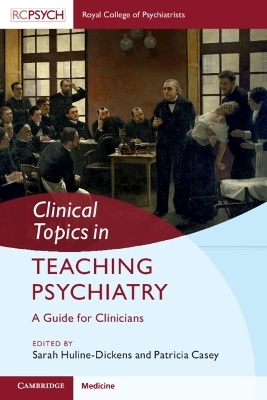
Clinical Topics in Teaching Psychiatry
Cambridge University Press (Verlag)
978-1-009-05469-0 (ISBN)
Clinical Topics in Teaching Psychiatry draws on classic papers previously published in BJPsych Advances, alongside newly commissioned chapters, to provide a rich overview of teaching and learning as applied to psychiatry. Written by clinicians, professors and lecturers, the book covers the direct teaching of the specialty through to educational management, coaching and mentoring. It examines diverse methods of teaching and learning, from journal clubs to simulation, and gives an updated overview of psychiatry in the foundation programme. It covers the challenges faced by trainers in recent times in delivering training virtually through webinars and remote placements. Newly commissioned chapters include how to conduct an online literature search, writing for learning and publication, delivering a good lecture and supporting trainees. Accessible throughout, the book provides much-needed guidance for busy clinicians, primarily psychiatrists, who are acting as trainers. It will also be an invaluable guide for trainees and other mental health professionals.
Sarah Huline-Dickens is a Consultant in Child and Adolescent Psychiatry at Mount Gould Hospital, Plymouth, UK, and Associate Dean for Health Education England (South West). She has occupied a number of educational roles in both undergraduate and postgraduate medicine, including Academic Clinical Lead for Mental Health at Peninsula Medical School and Training Programme Director. As Associate Dean she is involved in faculty development and the support of doctors in difficulty. She is a qualified coach, mentor and workplace mediator and has published many peer–reviewed papers and two books on psychiatry: Clinical Topics in Child and Adolescent Psychiatry (RCPsych Publications 2014) and A Clinician's Brief Guide to Children's Mental Health Law (RCPsych Publications 2016). Patricia Casey is a Consultant in Liaison Psychiatry at Hermitage Medical Clinic, Dublin, and Professor Emeritus of Psychiatry at University College Dublin, Ireland. She is Visiting Professor at the University of Notre Dame, Sydney, Australia, and Editor of BJPsych Advances for the Royal College of Psychiatrists. She has authored more than 130 peer-reviewed papers and twelve books, including Fish's Clinical Psychopathology: Signs and Symptoms in Psychiatry 4th Edition (Cambridge University Press, 2019).
Section I. Teaching and Preparation: 1. Improving patient care through continuing professional development Guy Brookes; 2. MRCPsych: preparing trainees and improving courses Jayne Greening, Erin Turner, Gareth Rees, Caroline Winkle, Eleanor Dryhurst and Radhika Kanessan; 3. Going beyond 'good enough' teaching in psychiatric training Neil Sarkar and Victor Cohn; 4. A guide to conducting an online literature search for medical educators Riccardo De Giorgi and Patricia Casey; 5. Writing for learning and publication Peter Tyrer and Andrew Northern; Section II. Teaching Methods: 6. Small and large group teaching Anne Worrall-Davies; 7. Whys and hows of patient-based teaching Monica Doshi and Nick Brown; 8. Simulation based learning in psychiatric training Anna Ludvigsen,, Sridevi Sira Mahalingappa and Subodh Dave; 9. Running journal clubs in psychiatry Geraldine Swift and Joshua Bellevue de Sylva; 10. Workshops: an important element in medical education Allys Guérandel, Brían Ó Ruairc and Hiberet Tessema Belay; 11. Delivering a good lecture Brendan D. Kelly; Section III. Feedback, Assessment, Supervision and Reflection: 12. Giving effective feedback to psychiatric trainees Nick Brown; 13. The postgraduate curriculum and assessment programme in psychiatry: the underlying principles Gareth Holsgrove, Amit Malik and Dinesh Bhugra; 14. Supervision of psychiatric trainees David Cottrell; Section IV. Bridging the Gaps: Foundation Years and Interprofessional Education: 15. Psychiatry in the foundation programme: an overview for supervisors Holly Smith and Arthita Das; 16. Interprofessional education in mental health services Daniel Kinnair, Elizabeth Anderson, Henderikus van Diepen, Cath Poyser and Kris Roberts; Section V. Technologies Old and New: 17. Portfolio-based learning in medical education Antonina Ingrassia and Oliver Batham; 18. Bringing smartphone technology into undergraduate and postgraduate psychiatry Melvyn W. B. Zhang, Cyrus S. H. Ho, Christopher C. S. Cheok and Roger C. M. Ho; 19. Evidence-based mental health and e-learning Katharine A. Smith, Katherine E. Stevens, Andrea Cipriani and John R. Geddes; 20. Powerpoint: avoiding the slide to damnation Guy Undrill and Fiona McMaster; 21. Virtual teaching and learning in psychiatric medical education Thomas Hewson, Sridevi Sira Mahalingappa and Subodh Dave; Section VI. The Trainee in Difficulty, Professionalism, Appraisal: 22. The trainee in difficulty: where are we now? Sarah Huline-Dickens; 23. Coaching and mentoring: an overview for trainers in psychiatry Sarah Huline-Dicken.
| Erscheinungsdatum | 28.11.2022 |
|---|---|
| Reihe/Serie | Clinical Topics in |
| Zusatzinfo | Worked examples or Exercises |
| Verlagsort | Cambridge |
| Sprache | englisch |
| Maße | 156 x 234 mm |
| Gewicht | 490 g |
| Themenwelt | Geisteswissenschaften ► Psychologie ► Klinische Psychologie |
| ISBN-10 | 1-009-05469-4 / 1009054694 |
| ISBN-13 | 978-1-009-05469-0 / 9781009054690 |
| Zustand | Neuware |
| Haben Sie eine Frage zum Produkt? |
aus dem Bereich


